PO-1 Engineering knowledge: Apply the knowledge of mathematics, science, engineering fundamentals, and an engineering specialization to the solution of complex engineering Programs.
PO-2 Problem analysis: Identify, formulate, review research literature, and analyze complex engineering problems reaching substantiated conclusions using first principles of mathematics, natural sciences, and engineering sciences.
PO-3 Design/development of solutions: Design solutions for complex engineering problems and design system components or processes that meet the specified needs with appropriate consideration for the public health and safety, and the cultural, societal, and environmental considerations.
PO-4 Conduct investigations of complex problems: Use research-based knowledge and research methods including design of experiments, analysis and
interpretation of data, and synthesis of the information to provide valid conclusions.
PO-5 Modern tool usage: Create, select, and apply appropriate techniques, resources, and modern engineering and IT tools including prediction and modelling to complex engineering activities with an understanding of the limitations.
PO-6 The engineer and society: Apply reasoning informed by the contextual knowledge to assess societal, health, safety, legal and cultural issues and the consequent responsibilities relevant to the professional engineering practice.
PO-7 Environment and sustainability: Understand the impact of the professional engineering solutions in societal and environmental contexts, and demonstrate the knowledge of, and need for sustainable development.
PO-8 Ethics: Apply ethical principles and commit to professional ethics and responsibilities and norms of the engineering practice.
PO-9 Individual and team work: Function effectively as an individual, and as a member or leader in diverse teams, and in multidisciplinary settings.
PO-10 Communication: Communicate effectively on complex engineering activities with the engineering community and with society
at large, such as, being able to comprehend and write effective reports and design documentation, make effective presentations, and give and receive clear instructions.
PO-11 Project management and finance: Demonstrate knowledge and understanding of the engineering and management principles and apply these to one’s own work, as a member and leader in a team, to manage projects and in multidisciplinary environments.
PO-12 Life-long learning: Recognize the need for, and have the preparation and ability to engage in independent and life-long learning in the broadest context of technological change.


Sakeshwar Gramin Vikas Seva Sanstha’s
ADSUL’S TECHNICAL CAMPUS
Approved by AICTE New Delhi| Recognized By Government of Maharashtra DTE and Affiliated to SPPU, Pune
Accredited by NAAC with B++, ISO 9001:2015 Certified


Home » Computer Engineering
OUR VISION
To strive for excellence in the field of Computer engineering through creative problem solving related to societal needs.
OUR MISSION
M1. Establish strong fundamentals, domain knowledge and skills among the students with analytical thinking, conceptual knowledge, social awareness, expertise in the latest tools and awareness to advanced software.
M2. Establish leadership skills, team spirit and high ethical values among the students
M3. Guide students towards research and development, and a willingness to learn by connecting themselves to the global society
M4. Encourage students to become free-lancers.

DR.JADHAV H.B.
We focus in imparting the core science underlying the computing aspects, so that students cope easily with today’s modern and upgrading technologies. We also strive to bridge the theory- practice gap by applying continuous effort in teaching, learning and by periodically measuring the outcomes. The department inculcates technical, analytical and communication skills in students that would suffice for any job in the current challenging world. The Department provides suitable environment that enables students to follow their instincts of learning and doing innovative things. The department has always been recognized for excellence in teaching and outstanding students’ performance at global level and for the excellent placement record in various international/national companies. All over the world, the alumni of the department occupy top positions in IT industries like Infosys, TCS, Tech-Mahindra, Cisco, Cognizant, Autos Syntel, Wipro and many more. The style and method of imparting education to students make them self-capable for life-long learning and ready for diversified carriers in IT Industry, Education, Research, Management and Entrepreneurship.
Program Specific Outcomes (PSOs)
PSO-01: Understand, plan, analyse, design and execution of buildings and infrastructures such as residential, public, industrial and irrigation structures, transportation facilities, powerhouses respectively.
PSO-02: Make use of management tools, optimization and leadership techniques to complete the
computer engineering projects within stipulated time and funds.
PSO-03: Contribute to the society for sustainable development through environmental awareness
and upholding professional ethics.
Program Outcome(PO)
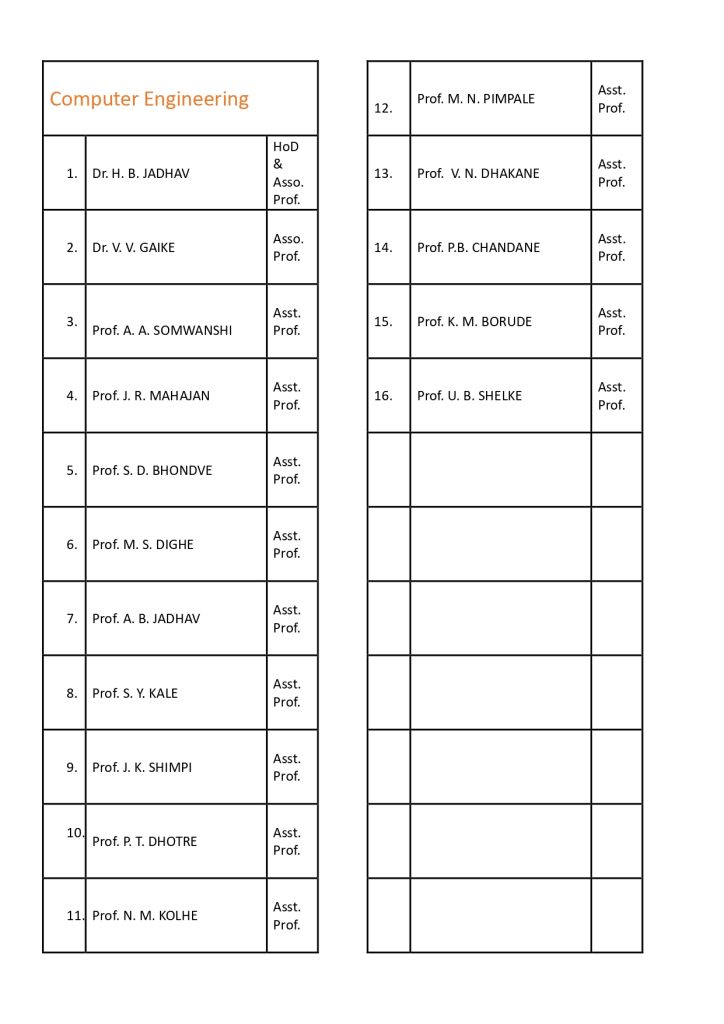

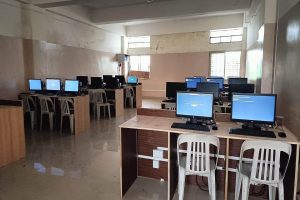
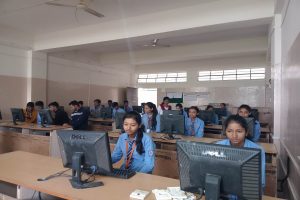
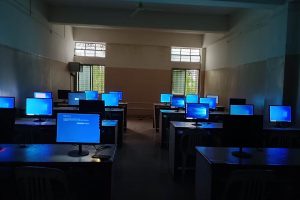
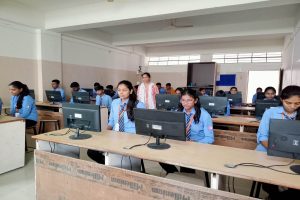
| Sr.No | Year | No.of Students |
|---|---|---|
| 1 | 2022-23 | 45 |
| 2 | 2021-22 | 28 |
| 3 | 2020-21 | 08 |
| 4 | 2019-20 | 05 |
| 5 | 2018-19 | 06 |
| Sr.No | Student Name | Year | %Result |
|---|---|---|---|
| 1 | KASAR RUTUJA VASANT | 2022-23 | 76 |
| 2 | FAND PRITI BALASAHEB | 2021-22 | 81.4 |
| 3 | KHARADE PRANOTI ANIL | 2020-21 | 83.33 |
| 4 | KALAPAD VAISHAV | 2019-20 | 77.87 |
| 5 | PAGAR HARSHALI YASHWANT | 2018-19 | 77.47 |
| 6 | KARKHILE SHWETA PRATAP | 2017-18 | 67.87 |
| 7 | KORHALE KANCHAN CHANGDEO | 2016-17 | 66.47 |
| 8 | SOLAT SUNNY GOVIND | 2015-16 | 66 |